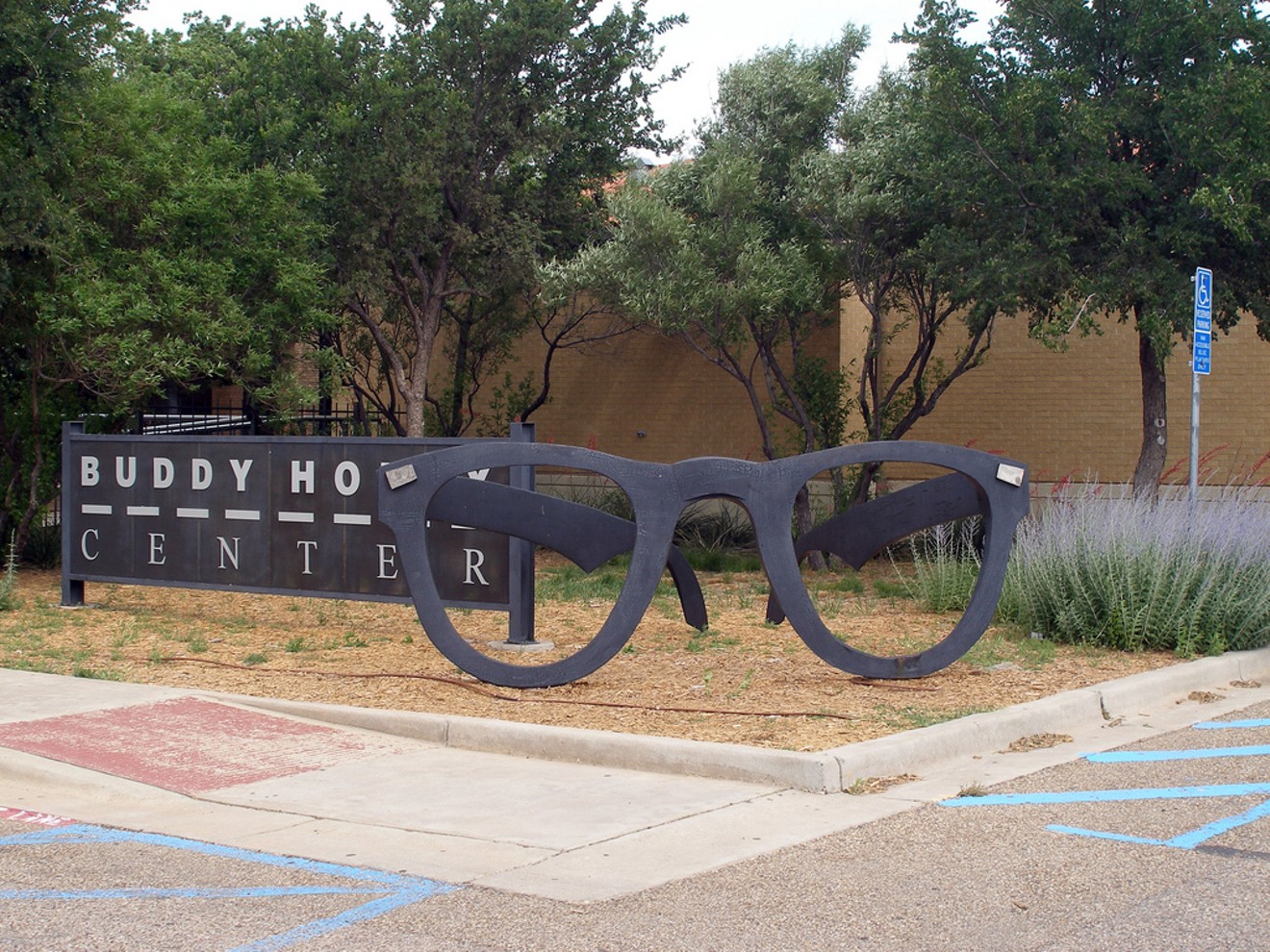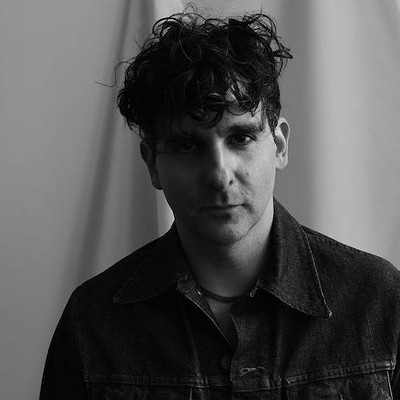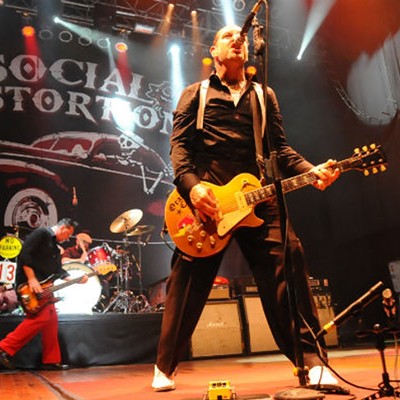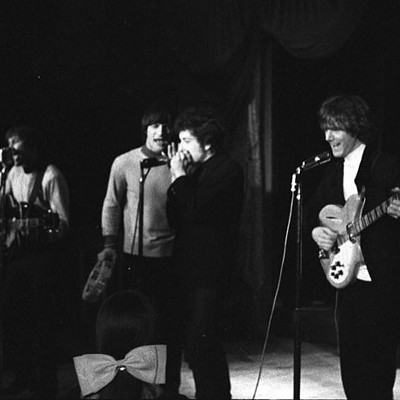But Holly and his doomed companions remain fixtures in the public’s imagination, spurred on by movies like 1978’s The Buddy Holly Story and 1987’s La Bamba and, most of all, the host of musicians who have picked up the torch that did not go out when that plane went down in a cornfield near Clear Lake, Iowa. It’s a long list, topped by the Beatles and Rolling Stones, both of whom included one of Holly’s songs as part of their first commercial recording – the Beatles in their Quarrymen days; the Stones on the U.S. version of their self-titled 1964 debut LP – and winding through Bruce Springsteen, Elvis Costello, Patti Smith, Chris Isaak, Spoon’s Britt Daniel and countless others.
At the very front of that line stands Joe Ely, one of Texas’s most celebrated singer-songwriters, who will celebrate his 70th birthday party with a February 10 bash at Austin’s Paramount Theatre. (Before that, he'll be at Tomball's Main Street Crossing tonight, and also February 16 at St. Andrew's Presbyterian Church's "Coffeehouse Live" series.) Ely is in a better position to appreciate Buddy Holly’s legacy than most. Like Holly, he grew up in the small West Texas city of Lubbock, moving there from Amarillo the same year Holly’s plane went down. He has played numerous events in Holly’s honor over the years, including his hometown’s Buddy Holly Festival; a 1988 TV special also featuring John Fogerty, Carl Perkins and Brian Setzer of the Stray Cats; and a 50th-anniversary concert in 2009 at the Winter Dance Party’s fateful last stop, the Surf Ballroom. Even today, Ely says at least one Holly tune is always in his set list – “Rave On,” “Well All Right,” “Not Fade Away,” or “Oh Boy!” an exuberant version of which appears on his 2000 album Live at Antone’s.
“I really had this impression, you know, hearing his stuff on the radio and all, I always thought he was from somewhere else,” Ely says. “I remember how surprised I was to find out that he actually grew up in Lubbock. Because I kind of thought at that time that all people who were in the music industry were from Nashville or New York.”
Unlike his friend and fellow future Flatlander Jimmie Dale Gilmore, Ely says he never saw Holly perform live the way Gilmore had at the show in Lubbock where Buddy and his band, the Crickets, opened for Elvis Presley and Johnny Cash. But besides hearing all of his songs on the radio in Amarillo, Ely recalls how Holly’s death seemed to inspire young people to pick up a guitar almost overnight. “Everybody,” he says, “was putting bands together in 1959.”
“It was kind of like the garage band became kind of a tribute to Buddy,” he continues. “Because he kind of just started playing with his band, you know, in the back room of his house. So that’s the thing that I recall – so many people were playing Fender guitars and Fender amplifiers to get that kind of twangy sound, and of course the drummers were playing a whole different rhythm.”
Upon arriving in Lubbock, Ely says, he sold his violin, which he had played in his school orchestra in Amarillo, and bought a guitar. By some sort of cosmic coincidence, he wound up taking guitar lessons in the same house in Lubbock where the Holley family had once lived – Buddy’s given name was Charles Hardin Holley – though he didn’t find out about that until years later.
“I found that out because I was playing at a Buddy Holly festival in Clovis, New Mexico, and the head of the Buddy Holly Fan Club had made a printed page of all the history of Buddy, including the places he lived in Lubbock, and I remember seeing that address,” Ely says. “I ran into him at the show in Clovis that night, and I asked him about it and he said, yeah, they lived there about a year, and Buddy went to J.D. Hutchison Junior High School, where I went when I was taking the lessons.”
Although the Buddy Holly Festival per se no longer exists, tourists still come from all over the world to visit the Buddy Holly Center, the museum and conference center that sponsors a variety of outreach programs (even guitar lessons) and a summer concert series. But the Lubbock Ely remembers growing up in was still very much a conservative cotton town. He and his band would drive out to the cotton fields to learn the songs they liked on the radio, because none of the stores in Lubbock even dared to stock Holly and his fellow rock and rollers’ records.
“They were kind of against the law, you know, because it was considered ‘race music,’” Ely reflects. “‘Rockabilly’ was kind of a dirty word.”
Not until The Buddy Holly Story, which landed a Best Actor Oscar nomination for an unknown ex-musician from Baytown named Gary Busey in the title role, became a success did Lubbock begin to embrace its most famous native son, Ely notes. Though the city has a respectable music scene today, it took that long for the city to come to grips with the social upheaval stirred up by Holly, Elvis and rock’s other pioneers.
“It made you wiggle, it made you dance, made you scream and run around in circles, you know?” Ely says. “It was just considered that it was an outside force that was ‘tainting’ the youth of America, and a force that should be stopped.”

Joe Ely says he still performs at least one Buddy Holly song during every show.
Photo by Will Van Overbeek
“I actually brought the Clash to Lubbock to show ’em around,” Ely chuckles. “I think they were kind of horrified, that here’s this town where the streets are eight lanes wide but there’s only a car about every five minutes. There was virtually no music scene except for out at the old honky-tonks. Because of that connection with Lubbock, I ended up recording with the Clash, and stayed in touch with Joe Strummer up until he died.”
You can hear Ely singing background vocals (in Spanish!) on the Clash’s 1982 hit “Should I Stay or Should I Go.” To him, it’s easy to understand why the British rockers felt a kinship with Holly’s music, which often roiled with the kind of raw energy that belied the singer’s mild-mannered image. That 1988 TV tribute to Holly features an incredible clip of the Crickets appearing on the Arthur Murray Dance Party program, as a couple of dozen clean-cut girls clad in their finest prom-like dresses can’t quite keep their shoulders from shimmying as the band destroys “Peggy Sue”; Holly especially looks like he’s an eyelash or two from crawling out of his skin.
“You listen to ‘Rave On’ or ‘Not Fade Away’ or any of those songs, and they are, for 1957, they’re pretty radical,” says Ely, who named his daughter Maria Elena after Holly's widow. “They definitely stirred up the teenage crowd, and encouraged people to take over their generation, so he was definitely a hell-raiser.”
However, Ely says he thinks that, at the time of his death, Holly was well on his way to becoming a successful pop crooner like Frank Sinatra, pointing to the sophisticated arrangements of the songs Holly recorded shortly before he died, while he was estranged from the Crickets, among them “True Love Ways” and “Raining In My Heart.” We may never know how that twist would have played out in the long term — the other members of the Crickets were attempting to convince Holly to rejoin the band, but couldn’t reach him on the road — but in the space of not even two years (“That’ll Be the Day,” Holly’s breakout, was released in May 1957), this country boy from Lubbock gifted the world a remarkable number of songs that are still unlikely to fade away anytime soon.
“It holds up very well,” agrees Ely of Holly’s music. “I don’t think it has lost any of its appeal.”
The Winter Dance Party tribute, featuring Adam Bricks, Nick Gaitan, DJ Big E and members of Son of Bitch, Mikey and the Drags, and Tipsy Kitten, is tonight at the Continental Club, 3700 Main. Doors open at 9 p.m. Joe Ely performs tonight at Main Street Crossing, 111 West Main in Tomball and February 16 at St. Andrew's Presbyterian Church's "Coffeehouse Live," 5308 Buffalo Speedway.







